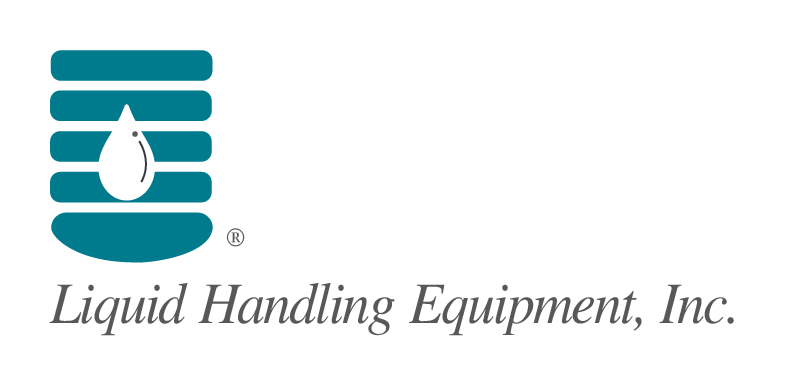POLY PROCESSING
Liquid Handling Equipment represents Poly Processing who are developers of innovative chemical storage systems. Issues like fuming, temperature sensitivity, weight and chemical reaction are used to create the ideal storage situation for a specific chemical, at the drawing-board level. Let Liquid Handling Equipment and poly storage tank systems design and optimize your system’s safety, longevity and compatibility, based on the properties of the stored chemical. When chemical storage solutions are smarter, your job is easier.

SODIUM HYPOCHLORITE TANKS AND CONTAINERS
An aggressive oxidizer that presents a major storage challenge: Sodium Hypochlorite (bleach) is used in a variety of applications, particularly in disinfecting drinking water and wastewater.
When storing this chemical, three factors must be considered:
- UV can degrade sodium hypochlorite, so special precautions must be taken to reduce this effect.
- Sodium hypochlorite typically contains transition metals such as nickel, iron, and copper, which can build up in a storage tank and create off-gassing.
- “Hypo” is a potent oxidizer, so all materials in the chemical’s storage tank must be up to the task.
By addressing all three of these issues, this caustic chemical can be contained in a more secure and effective manner, with a tank system that meets NSF/ANSI Standard 61 for chemical storage.

SULFURIC ACID TANKS AND CONTAINERS
Challenging a storage tank’s strength and design safety: Sulfuric acid is used in a huge array of industrial applications, from water and wastewater treatment to the manufacture of chemicals, fertilizer, and car batteries.
This highly exothermic acid presents serious storage challenges:
- Sulfuric acid is an extremely heavy chemical that will test the mechanical integrity of any material.
- The addition of water to concentrated sulfuric acid leads to the dispersal of a sulfuric acid aerosol – or worse yet, an explosion.
- If sulfuric acid is spilled on metals, it can create highly flammable hydrogen gas.
- Skin and other bodily burns from sulfuric acid are potentially more serious than burns from other strong acids. Sulfuric acid dehydrates whatever it touches, and the heat caused by that reaction with water can create secondary thermal damage.
Poly Processing’s tanks and fittings can be combined specifically to contain sulfuric acid, reducing the risks presented by this highly acidic chemical.

HYDROCHLORIC ACID TANKS AND CONTAINERS
Controlling a chemical and its fumes: Also known as muriatic acid, hydrochloric acid is used to acidize petroleum wells, remove scales from boilers, aid in ore reduction and serve as a chemical intermediate, among other applications.
This pungent liquid is a strong, highly corrosive acid, and it presents serious storage challenges:
- Hydrochloric acid has an extremely low pH, making it highly corrosive.
- The chemical creates toxic fumes that can deteriorate equipment – and these fumes can be fatal to employees. To control the chemical’s fumes, the tank’s venting system must be exact.
- Tank maintenance can also be an issue because of fumes. Entering the tank must be avoided at all costs, and part replacement must be minimized.
By creating a strong, corrosion-resistant tank system that ties into a scrubber system, all of these issues can be addressed.
Defying a chemical that “finds” leaks: Also known as caustic soda or liquid lye, sodium hydroxide is used to adjust pH in water and wastewater treatment and in the manufacture of chemicals, rayon, cellophane, pulp and paper, aluminum, detergents, soaps and a wide range of other products.
As for storage:
- Sodium hydroxide is a “slippery” chemical that tries to find leak paths.
- This chemical is extremely corrosive to tissue. It is also highly toxic if ingested.
- If sodium hydroxide is not kept at a specific temperature, it will crystallize and go solid.
A tank system and proper fittings from Poly Processing can reduce your risk with this hazardous chemical.
FERRICS, ALUMS AND POLYMERS
Containing chemicals that react to their environment: Ferrics, alums, and polymers are commonly used to treat water and wastewater. There are several reasons why these substances require specialized storage:
- Separation, settling and coagulation are major issues with these chemicals – and those conditions can be compounded by temperature variations.
- Settling and separation issues can lead to difficulty in pumping the chemicals.
- The chemicals are often delivered at elevated temperatures, testing the expansion and contraction capabilities of a tank.
- Ferrics create fumes that can defoliate surrounding trees and plants.
- Polymers can act as an environmental stress-cracking agent.
By providing the right kind of storage for these chemicals, safety can be maintained – and the integrity of the product can be preserved.
Hydrogen Peroxide Tanks and Containers
Accommodating a potentially explosive chemical: Available in a variety of concentrations, hydrogen peroxide is used as an oxidizing agent in textile, paper and fur processing. It is also used as a plasticizer, a polymerization catalyst, and a water and sewage treatment chemical.
It poses a number of challenges when it comes to storage:
- Concentrated solutions are highly toxic and are strong irritants.
- Hydrogen peroxide is relatively unstable and decomposes into water and oxygen when exposed to the environment. The primary danger of this composition is fire and/or explosion.
For concentrations of hydrogen peroxide that are below 50%, high-density crosslinked polyethylene is a smart option.
A urea-based chemical reactant designed specifically for use in SCR systems to reduce NOx emissions: To meet 2010 EPA regulations in North America, most producers of diesel engines have announced plans to use Selective Catalytic Reduction (SCR) technology, requiring Diesel Exhaust Fluid (DEF).
- Diesel Exhaust Fluid (DEF) is a high purity chemical fluid and should be treated similarly to engine oil.
- Never store Diesel Exhaust Fluid (DEF) in old oil or diesel tanks.
- Never add anything to Diesel Exhaust Fluid (DEF). For example, adding water to Diesel Exhaust Fluid (DEF) will damage your SCR system and could void your vehicle warranty.
By providing the right kind of storage for this chemical, safety can be maintained – and the integrity of the product can be preserved.
Leachate and Condensate Tanks and Containers
Tank designs to meet the life cycle cost of a landfill: Leachate and condensate from landfills can contain hazardous constituents either as a direct result of the waste disposed in the facility (e.g., household hazardous wastes) or as a result of the breakdown of the chemical compounds found in waste (e.g., leachate derived constituents).
Poly Processing Company’s Cross-linked Polyethylene tanks will perform under almost any circumstance:
- Chemically compatible with most every dissolved and solid material found in landfill leachate/condensate including acids, aldehydes, ammonia, pathogens, metals, etc.
- 20 times the Environmental Stress Crack Resistance of High-Density Linear Polyethylene tanks.
- Seamless construction which eliminates the potential for chemical attack points and bad welds/joints found in Fiberglass tanks and Steel tanks.
- Cross-linked Polyethylene tanks are not affected by the unpredictable composition of leachate/condensate and never need maintenance. Leachate/condensate will severely damage epoxy, concrete, and powder coated tanks leading to costly maintenance.
- Installations in typical landfills as well as hazardous waste landfills for over 25 years with no issues.
By providing the right kind of storage for these chemicals, safety can be maintained – and the integrity of the product can be preserved.
WE SERVICE & SELL TO NC, SC, VA & N.W. GA ONLY
WHY CHOOSE US AS YOUR SUPPLIER
Extensive Stock & Quick Delivery
We maintain a comprehensive inventory of Poly Processing products, ensuring prompt delivery to minimize your operational downtime.
Expert After-Sales Support
Our commitment includes installation assistance and ongoing maintenance, ensuring your Poly Processing products perform optimally.
Trusted Partnership with Poly Processing
As a recognized supplier, we provide access to the latest innovations backed by Poly Processing’s industry expertise.
Commitment to Quality and Sustainability
We align with Poly Processing’s focus on sustainability, offering high-quality products that support environmentally responsible practices.
Contact a Dedicated Liquid Handling Equipment Representative
Liquid Handling Equipment offers an extensive range of products through
partnerships with industry-leading manufacturers. Depend on us to deliver
solutions that enhance your facility’s operations and efficiency.

